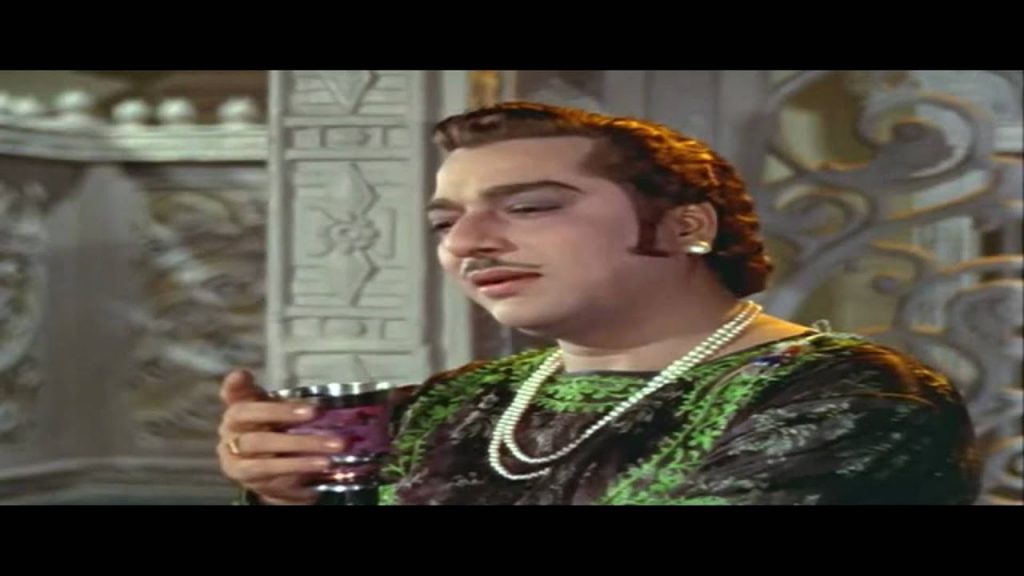
‘Man re tu kahe na dheer dhare’ is a pensive song which conveys the quintessence of life about letting go of the good and bad. In 2010, Outlook India magazine asked 30 Indian leading composers, lyricists and singers to name their all-time favorite Hindi songs. A list of top 20 songs was published and the top of the chart was ‘Man Re.’ The song is from movie Chitralekha (1964), sung by the great Mohammed Rafi, music by Roshan and lyrics by Sahir Ludhiyanvi. All three Roshan, Rafi and Sahir have created one of the most beautiful and cherished song for ever.
Can you imagine this song failed to top the charts in Binaca geetmala at that time as it was far too classy for the tastes of the masses. Music director Roshan was heartbroken at the lukewarm response from the public. This song was RJ Ameen Sayani’s favorite song as well and he was just as disappointed as Roshan that his Binaca geetmala programme failed to value this song.
The song is based on raga Yaman Kalyan. This raga conveys tranquility; it’s known as shant raga. Yaman’s serenity is close to everyday life. It evokes peace in mind. It sooths and calms the mind. Roshan chose to compose the song which has a blend of shant rasa of Yaman combined well with bhakti rasa (devotional feel). It is an ideal raga for devotional compositions. The orchestra of the song is very simple and comprises of two main instruments sarod and flute. You will hear sarod more prominently which was played by Mr Arvind Kumar Mathur, a noted Sarod Player of those days.
The song conveys the philosophy of life; we are caught in the whirl of desires which are unending; we run after so many materialistic wants at the cost of sacrificing our morals and principles totally. Our mind is so anguished in the unending needs and wants, that we hardly realize the purpose of our life. While the fact is that we cannot control joys and sorrows of life and we cannot control beauty and youth in life. The link between life and death is dreams and dreams are nothing but illusion. We all have come alone and will die alone when will the mind realize this reality? Therefore the song tells to practice detachment.
I am a big fan of Mohd Rafi. He was par excellence playback singer Yesterday, Today and Tomorrow. The uniqueness of Rafi’s voice was softness followed by a very high pitch. Mohammed Rafi lent his voice to some not so famous heroes on the silver screen and because of his marvelous voice those heroes became well-known. I always think that God sang through Rafisab’s voice.
Roshan had a penchant for sensitive poetry. He used to care a lot of the lyrics. While some music directors have a passion for instruments, others for the perfect pitch, yet others for rhythm. Just a few, like Roshan, also had their focus on the words that their music would carry to the ears of the listeners. He had a heart of poet.
Sahir Ludhiyanvi wasn’t merely a revolutionary poet he was a poet sensitive to the human conditions. He was genius and his poetries attracted people close to him. It is believed that Sahir was a non believer in God, but while listening to this song, you feel the poet connecting with God through the incredible lyrics written by him. One can say Sahir understood the philosophy of life much better than any other lyricist.
The soul of movie “Chitralekha” is Bhagwati Charan Verma’s story, finely tuned by the extraordinary poetry of Sahir Ludhianvi in the company of Roshan’s heart-rending music. Verma’s novel by the same name outlined the long standing dilemma between good and bad, moral and immoral in this world and was adapted for the screen by Kidar Sharma who believed in entertainment with a reason. The film is about the love story between Chitralekha (Meena Kumari) and Prince Beejgupt (Pradeep Kumar) and how she renounces the world when she realizes that her love is hindering Beejgupt from his administrative duties. On screen this beautiful song is sung by Pradeep Kumar who could perhaps lift the song with more emotions.
Rafi poured his heart into the song to expound the futility of life and love and made the song Man Re Tu Kahe Na Dheer Dhare eternal.












































